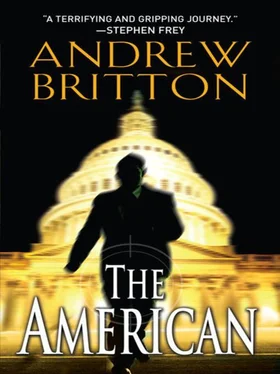Andrew Britton - The American
Здесь есть возможность читать онлайн «Andrew Britton - The American» весь текст электронной книги совершенно бесплатно (целиком полную версию без сокращений). В некоторых случаях можно слушать аудио, скачать через торрент в формате fb2 и присутствует краткое содержание. Жанр: Триллер, на английском языке. Описание произведения, (предисловие) а так же отзывы посетителей доступны на портале библиотеки ЛибКат.
- Название:The American
- Автор:
- Жанр:
- Год:неизвестен
- ISBN:нет данных
- Рейтинг книги:3 / 5. Голосов: 1
-
Избранное:Добавить в избранное
- Отзывы:
-
Ваша оценка:
- 60
- 1
- 2
- 3
- 4
- 5
The American: краткое содержание, описание и аннотация
Предлагаем к чтению аннотацию, описание, краткое содержание или предисловие (зависит от того, что написал сам автор книги «The American»). Если вы не нашли необходимую информацию о книге — напишите в комментариях, мы постараемся отыскать её.
The American — читать онлайн бесплатно полную книгу (весь текст) целиком
Ниже представлен текст книги, разбитый по страницам. Система сохранения места последней прочитанной страницы, позволяет с удобством читать онлайн бесплатно книгу «The American», без необходимости каждый раз заново искать на чём Вы остановились. Поставьте закладку, и сможете в любой момент перейти на страницу, на которой закончили чтение.
Интервал:
Закладка:
CHAPTER 20
TAJIKISTAN,PRETORIA
Deep in the cold bowels of the Tian Shan mountain range, the man known as the American held his audience rapt with the plan that he had carefully conceived over the previous few weeks. It was a plan that would establish Al-Qaeda’s dominance over world events, as well as providing them with a sponsor nation in Iran.
The plan appealed to his audience for these reasons and more.
The three men who sat in the cave shared a sickness. It was a disease that was never spoken of in plain terms, but once disguised as revolutionary fervor, it became a topic of discussion that could hold their collective attention for many hours. The disease could be seen in their shining eyes, and in the rapturous smiles that creased their faces when they talked about the technical difficulties of destroying a city block and murdering the president of the United States, as well as the leaders of two other nations, all at once.
“The most difficult part of the operation is already accomplished,” Vanderveen said. His Arabic was nearly flawless. Eleven years earlier he had been sent to the excellent Defense Language Institute in Monterey, only to be returned to his unit after three months when his proficiency surpassed that of the program’s director.
At the time, he had modestly accepted the man’s praise and a syrupy letter of commendation. Now, deep in the hellish caves, he made no effort to hide his arrogance. “The Iranian is my only concern… Can he be trusted?”
Al-Zawahiri nodded, staring sadly into his empty cup. The thermos had long since run dry, much to his disappointment. “I do not believe Mazaheri would cheat us, especially after what you have already done for him in escorting the container to Arak. He has my confidence.”
“Is it what I asked for?”
“Actually, it is somewhat more: 545 bricks of SEMTEX H. The plastique is out of the Czech Republic. Each brick weighs 2,500 grams. The total weight of the shipment, if I am not mistaken, is-”
“About 1,360 kilos, or a little over 3,000 pounds. I believe that will be enough.”
Al-Zawahiri was vaguely impressed with the man’s rapid calculations. He would have been stunned to learn that the American could have done the same math in his sleep at five years of age.
“The challenge comes in creating a kill zone wide enough to encompass the entire convoy,” Vanderveen continued. “Despite Shakib’s contributions, there are things we don’t know.”
“For instance?”
“How the recent attacks will affect Brenneman’s security situation, for one thing…”
As the American explained the numerous factors that might prevent a successful strike, a very different conversation was taking place 750 miles to the southwest.
The Vanderveen family history, as described by Ambassador Martins, was sketchy at best. There was a fading birth certificate, he explained, a wilted document from the eastern Transvaal dating back to 1964. For their purposes, it was worthless.
For the time being, the first ten years in the life of William Vanderveen would remain a mystery.
There was also documentation dating back to 1975. These were medical records held at the Rand University in Johannesburg. They verified that a young man, accompanied by his mother, had visited the psychology department in February of that year. The boy’s scores were astronomical; well beyond the top 1 percent of the population, and yet his family had declined numerous requests for follow-up testing.
According to the file, the psychologist who had administered the exams, a Dr. Wilhelm D. Klerk, had expressed bitter disappointment that the woman and boy had never returned to his department. This disappointment had been tempered when the doctor discovered that they belonged to Francis Vanderveen, the famed South African general; it was only to be expected that the family would seek privacy in such matters.
Ryan Kealey made an effort to listen dispassionately, but soon found himself consumed by conflicting emotions; deep down, he wanted nothing more than to kill the man who had betrayed and murdered five of his fellow soldiers. At the same time, he felt a desperate need to understand, as though understanding might erase some of the lingering pain and guilt. Ryan listened to the ambassador intently, but was fast with the questions: “Who was this General Vanderveen?” he asked. “Why was he so important?”
Martins answered this to the best of his ability. He talked about South Africa’s policies during the apartheid years, and he explained that the military was often the first line of defense against African uprisings in the capital and major cities such as Johannesburg and Cape Town.
“When Daniel Malan took power in 1948, he immediately dismissed several high-ranking army officers who were known to be unsupportive of his policies. At the time, Francis Vanderveen was a captain in the 11th South African Special Services Battalion. He survived the purging of the ranks, though, mostly because it was widely rumored that he had been collecting damaging evidence for years, files that tied many of the National Party’s most prominent figures to the Nazis during the second World War.”
“In other words,” Naomi said, “Vanderveen was untouchable.”
The ambassador nodded. “Precisely. However, that is not to say that he disagreed with Malan’s views. In fact, he had long been noted for his support of the Afrikaner Broederbond.
“In 1959, Vanderveen established a liaison between the South African Defense Forces and the Bureau of State Security. This position gave him the authority to oversee both military and police matters in South Africa. By that time he was a colonel, and responsible for enforcing the Pass Laws and Section 10 of the Black Urban Areas Act of 1945. I won’t bore you with the details, but this was legislation that served to confine black Africans to demarcated areas in remote parts of the country, thereby providing the illusion, if not the reality, of a white South Africa.”
“How could one man oversee that kind of operation?” Kealey asked.
“He didn’t,” was the ambassador’s reply. “He had a huge staff on hand, not to mention the army itself. Nevertheless, there is evidence that Vanderveen led many of the raids himself. In the 1960s alone, it’s estimated that he orchestrated the removal of almost two million black Africans.”
Naomi considered this piece of information for a moment. “You know, I took a course last year at GWU where we looked pretty closely at apartheid and its role in South African history. I don’t recall seeing this man’s name anywhere.”
Martins sipped at his coffee and nodded slowly. “You wouldn’t have. You see, Francis Vanderveen was very effective at his work, but his tactics were something of an embarrassment to the government, even a government as ruthless as Malan’s. As he went about enforcing Section 10, the colonel didn’t always wait until the houses were vacated before moving in with the bulldozers. Worse yet, there were rumors that he had a hand in the Sharpeville massacre of 1960.”
“I did read something about that,” Kharmai interjected. “The security forces opened fire on a group of African protesters outside a police station. The officers later reported hearing shots, but no weapons were ever found on the bodies.”
“That’s right. Sixty-nine people died in the square, with another hundred or so wounded. Vanderveen had quite a reputation by this time. No one was foolish enough to accuse him outright, but everyone knew who had given the order to fire. Incredibly enough, Vanderveen’s career wasn’t damaged in the slightest by that incident. In fact, he was promoted to brigadier general in 1964. That was the same year of his son’s birth.”
Читать дальшеИнтервал:
Закладка:
Похожие книги на «The American»
Представляем Вашему вниманию похожие книги на «The American» списком для выбора. Мы отобрали схожую по названию и смыслу литературу в надежде предоставить читателям больше вариантов отыскать новые, интересные, ещё непрочитанные произведения.
Обсуждение, отзывы о книге «The American» и просто собственные мнения читателей. Оставьте ваши комментарии, напишите, что Вы думаете о произведении, его смысле или главных героях. Укажите что конкретно понравилось, а что нет, и почему Вы так считаете.












